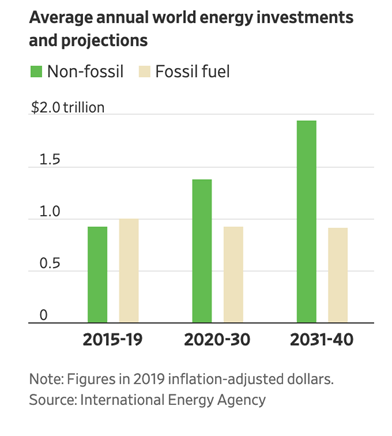Like it or not, the presidential transition is now in full swing. The outgoing administration is working overtime [paywall] to approve a collection of new, large, energy and mineral projects on federal lands in hopes of locking in their version of a ‘business first’ approach to climate and the environment.
Meanwhile, President-elect Joe Biden’s key cabinet nominees view the relationship between the environment and the economy quite differently from the Trump team. Biden’s nominee for Secretary of Energy, for example, is bullish on renewables and the jobs they’ll provide, and his chosen ‘climate czar’ sits on the board of CERES – a nonprofit composed of investors and environmentalists who make a powerful business case for climate action.
That’s been our mindset for some time, and it is good to see it’s gaining traction. As always, we welcome your feedback and reactions.
Warmly,
The C-Change Conversations Team
Notable Quote
Notable Video
Kicking off our theme of innovation and investment toward a green economy, enjoy this video that envisions American roads paved with something more valuable than gold: solar panels.
News of Hope
We’re buoyed that such economic opportunities seem very much in the sights of the climate and energy team that Biden announced this month. As Fox News reports, the lineup signals the President-elect’s commitment to “ambitious” climate action and – combined with his chosen economic team [paywall] – we see a coherent strategy emerging to align U.S. economic, energy, and environmental policies behind a climate agenda.
At the same time, ever more members of the business community are backing economy-wide climate action. The Wall Street Journal (among others) carried the news that leaders of more than 40 large U.S. corporations representing a broad swath of the American economy penned a letter to Congress urging cooperation with the incoming administration on climate issues. The letter echoed arguments that leveraging U.S. innovation and investment around climate solutions is a recipe for economic growth and called for the U.S. to rejoin the Paris Agreement on climate.
That agreement commits its national signatories to major reductions in greenhouse gas emissions. And while the Biden Administration begins to chart a new course in that direction, Princeton University offered a roadmap to get there, itemizing exactly what needs to be built, when, and where. The Net-Zero America study spells out no fewer than five energy-mix scenarios that could transition the economy to net-zero greenhouse gas emissions by mid-century. Crucially, none of the five scenarios would cost more than the country spends now on energy, and all would result in net job gains for American workers.
Meanwhile, Congress proved that bi-partisan cooperation around a green economy is possible when it passed the massive COVID relief and federal spending package. Forbes magazine described the bill as a “stimulus for clean energy,” noting the legislation’s many green tax credits and bipartisan support for them.
News of Concern
Notable Graph




Your point of view caught my eye and was very interesting. Thanks. I have a question for you.